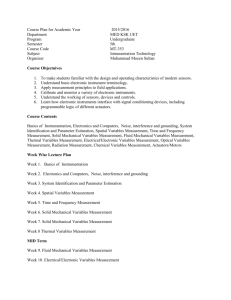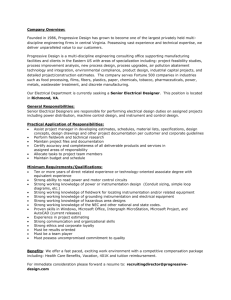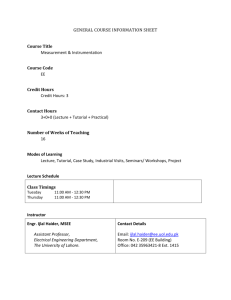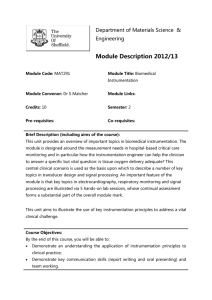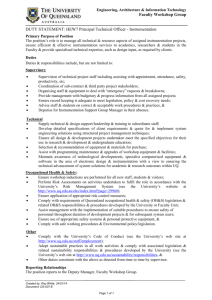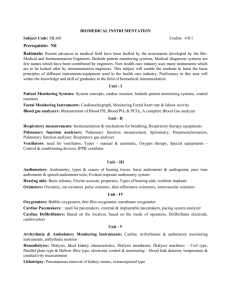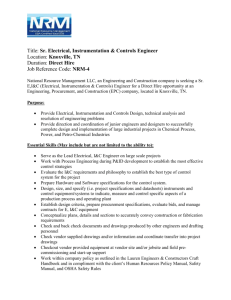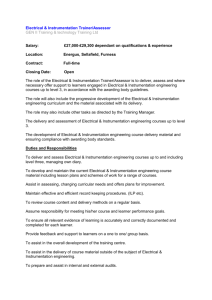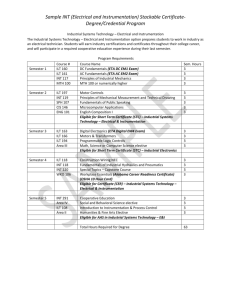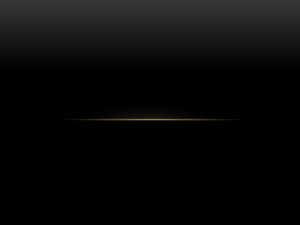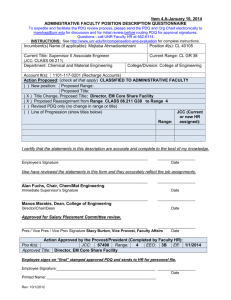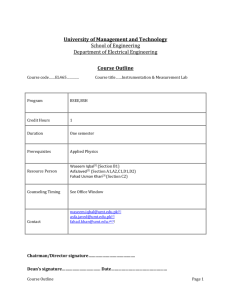Instrumentation & Measurements
advertisement
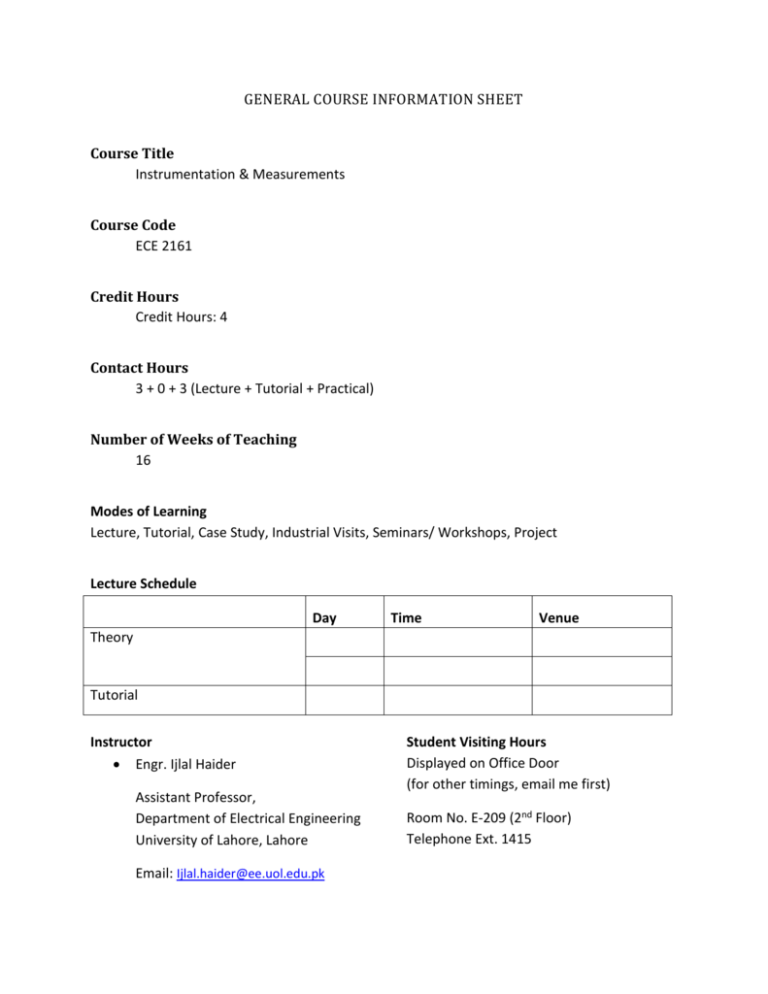
GENERAL COURSE INFORMATION SHEET Course Title Instrumentation & Measurements Course Code ECE 2161 Credit Hours Credit Hours: 4 Contact Hours 3 + 0 + 3 (Lecture + Tutorial + Practical) Number of Weeks of Teaching 16 Modes of Learning Lecture, Tutorial, Case Study, Industrial Visits, Seminars/ Workshops, Project Lecture Schedule Day Time Venue Theory Tutorial Instructor Engr. Ijlal Haider Assistant Professor, Department of Electrical Engineering University of Lahore, Lahore Email: Ijlal.haider@ee.uol.edu.pk Student Visiting Hours Displayed on Office Door (for other timings, email me first) Room No. E-209 (2nd Floor) Telephone Ext. 1415 Prerequisite Basic Electrical & Electronic Engineering Electrical & Electronic Engineering Laboratory Signals & Systems Electronic Devices & Circuits Tools required MATLAB LabVIEW Microcontrollers Trivia This course is a core course for students of Bachelor of Engineering in Electrical. Purpose To motivate the students to understand and explore the field of Instrumentation. This course does not serve as a prerequisite for any other undergraduate course. However the knowledge acquired will facilitate the student to work in industry, higher studies in the relevant field and in project (if required). Desired Outcomes At the end of the course, students are expected to: - Effectively communicate about measurement and related terminologies - Understand essentials of various sensing and actuating devices and their applications - Acquire basic knowledge of computers, communication and data acquisition in industrial environment - Enhance knowledge of instruments in multidisciplinary application - Use his knowledge for real world problems - Understand codes and standards and other working knowledge in the field Contribution of the Course towards Meeting Professional Goals This course will enable the student to: - Understand industrial process/system Design and analyze them using feedback Use analytical, creative and problem solving skills Work in teams towards a goal Recognize the need for keeping up-to-date in the rapidly changing technological world Recommended Literature - A. Morris, 2008, Measurement & Instrumentation Principles, (citation required) - W.C. Dunn, 2005, Fundamentals of Industrial Instrumentation and Process Control, 5th Edition, McGraw-Hill - J. Fraden, 2004, Handbook of Modern Sensors, Physics, Designs and Applications, 3rd Edition, Springer-Verlag - J. Park and S. Mackay, 2003, Elsevier Practical Data Acquisition for Instrumentation & Control System, Newnes (and other relevant books from this series) - J.G. Webster, 1999, Measurement, Instrumentation and Sensors Handbook, 1st Edition, CRC Press - U.S. Department of Energy, 1992, DoE Fundamentals Handbook- Instrumentation and Control - Explore Internet - (visit http://saba.kntu.ac.ir/eecd/taghirad/E%20books/Ebooks.html for eBooks) Assessment Total Marks: 400 Type Description Exercises Assignments Quizzes Case Study Project Technical Visit Seminar/Workshop Class Performance Mid Semester Exam Semester Final Exam Comprehensive based on tutorials based on lectures quarterly assessment (Best 3 will be considered out of 4) to be presented before semester final exam to be presented before semester final exam any outcome in the form of report, presentation or lecture any outcome in the form of report, presentation or lecture in class assessments assessment on first half of semester assessment on second half of semester full semester assessment (Practical Design Problem) Marks Course Policies Exercises, assignments and reports shall be submitted by due date, “No Late Submissions Will Be Entertained”. Assigned tasks must be written on A4 size neat papers and should be legible and written in an orderly manner. Keep in mind “No plagiarism”. There will be 4 quizzes and best 3 will be counted towards final assessment. As per department policy 75% attendance in the class is mandatory in order to qualify to sit in the exam. A group-based working for solving homework problems is allowed. However, the work that you hand-in must be your own. Remember that solving homework problems by yourself will also allow you solving unseen problems that you will be seeing on your class tests and the final examination. Class lectures will NOT cover everything in the recommended text(s). It is expected that you’ll solve number of examples given in the text(s) which are not covered in the class. Further, you will also be required to solve ‘end-of-the-chapter’ problems given in the text(s). You are advised to ask questions on the course material being presented to you, and you are expected to participate in the class discussions. Course Outline - - - Introduction to measurement and instrumentation Units and standards of units Static & Dynamic Characteristics of Instruments Laboratory instruments and their principles Transducers o Sensors and its various types o Actuators and Control Display Devices and Recording Systems Signal conditioning in Measurement and Instrumentation Alarm and trip systems Energy Meters Fundamentals of Industrial Computers Virtual Instrumentation Data Communication for Instrumentation and Control Industrial Networks (Fieldbuses) Data Acquisition and Control Brief introduction to o Piping& Instrumentation diagrams o System documentation o Computer Control: SCADA, DCS, NCS Application of Instrumentation in various disciplines (Medical, Supply Chain etc) Health, Safety and Environment for Instrument Engineers Project Management and Leadership for Instrument Engineers International codes and standards Lecture Plan 1 What is the orientation of this course? Meaning and objectives of measurements and Instruments Various types of Instruments used in industry and lab 2 Systems of Measurements, Conversions Static Characteristics of Instruments: Desired Static Characteristics of Instruments: Undesired 3 Dynamic Characteristics of Instruments Sensing and Transducing Process Temperature and Heat Measurement 4 Temperature and Heat Measurement Pressure Measurement Level Measurement 5 Flow Measurement Force, Torque and Strain Measurement Position and Motion Detection 6 Density and Viscosity Measurement Humidity Measurement Sound and Light Measurement 7 pH and Chemicals Measurement Composition Measurement Radiation Detection 8 Safety Sensors: Fire, Smoke etc. Energy Meters ---Review--9 MID SEMESTER EXAM 10 11 12 13 14 15 16 17 18 SEMESTER FINAL EXAM List of Experiments No. 1 2 3 4 5 6 7 8 9 10 11 12 13 14 Title Remarks
